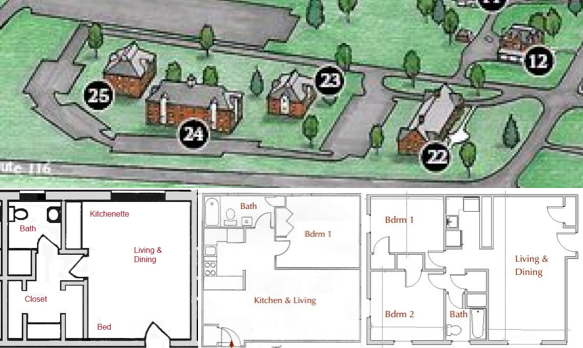Res. Life adds housing in response to increased enrollment

Residence Life has added new housing options at the Lutheran Theological Seminary at Gettysburg and 25 S. Washington Street. Above: Stuemplfe (25), Heiges (24) and Baughman (22) halls at LTSG. Floor plans for the seminary options are shown, left to right, for Baughman, Heiges and Stuempfle halls (Photos edited from GCPR).
By Jennifer Kiebach, News Editor
A larger-than-expected first-year class and a high retention rate of upperclass students has forced the college to make some changes to its usual housing options.
According to Director of Admissions Gail Sweezey, the Class of 2016 students is by far the largest first-year class in Gettysburg College history. The Class of 2013, which had 739 first-year students, comes in a fairly distant second.
The retention rate for upperclass students is also expected to be particularly high this year. All together, the college is expecting approximately 100 more students this year than were enrolled last year.
“It certainly wasn’t something that was predicted,” Sweezey said of the large first-year class.
The numbers came as somewhat of a surprise because the college accepted only seven more students than it did last year. The number of students who decided to attend Gettysburg after receiving acceptance letters, however, increased from 732 last year to approximately 778 this year.
While the increase may bode well for the college, the drastic increase in the number of students on campus presented somewhat of a challenge for the college’s Residence Life staff.
One of the biggest challenges arose from the fact that the six buildings that have traditionally provided first-year housing can only accommodate 747 of the approximately 778 first-year students.
To solve this dilemma, the college has placed 31 first-year students in Musselman Hall, which is in the same area of the campus as the other first-year halls.
“We felt that we could provide a comparable experience in Musselman that we could in other halls,” said Director of Residence Life Victor Arcelus.
Residence Life gave upperclass students who had been registered to live in Musselman during the upcoming academic year the option of moving to other vacant spaces on campus. Upperclassmen who decided to relocate did so entirely by choice.
“We did not force anyone out of Musselman,” Arcelus said.
The college also added additional spaces for upperclass students in two areas near the campus.
A property at 25 S. Washington St., which served had previously provided student housing up until two years ago, was renovated to provide housing for 18 upperclass students in the coming academic year.
The front half of the building will serve as the home of the Special Olympics theme house.
The college also worked with the Lutheran Theological Seminary at Gettysburg to offer an additional 29 upperclassmen spaces, including 13 efficiency apartments, eight one-bedroom apartments and four two-person apartments.
According to Arcelus, about 50 upperclassmen applied to live at the seminary this year. Students were selected for the spaces based on Spring 2012 housing lottery numbers. Readmitted students who did not receive a lottery number in the spring were assigned based on their cumulative GPA.
Although students at the seminary will have a one-mile commute to the Gettysburg campus, the apartments have a number of features that Arcelus believes students will find make them worth the distance.
At $5,660 for the year, seminary apartments are significantly less expensive than apartments and single rooms on campus, which cost $7,100 per year. Additionally, all of the apartments have single bedrooms and offer more space per student than any other housing option on campus.
Students at the seminary also have the option of choosing one of two reduced-price college meal plans, or no meal plan at all, and they receive free parking outside of their buildings at the seminary and on the Gettysburg College campus.
Additionally, the college is exploring whether the Freedom Transit Shuttle can provide service between the seminary and Gettysburg College.
“The spaces are really nice,” Arcelus said. “I think the students living there are going to have a good experience.”
This year was not the first time that the college has worked with the seminary to provide additional housing. From 2006 to 2010, Wolfe House at the seminary served as the home of several Gettysburg College theme houses.
The college decided at the end of 2010 to discontinue college use of the building because it could only accommodate eight students.
Arcelus said he thinks that this year’s seminary options will prove more practical because enough Gettysburg students are living their own community. He says it still will not, however, compare to the residential experience that traditional on-campus students have.
“Ideally, we want to have students closer to campus,” he said.
Whether or not the college offers seminary housing again in the future will depend on the number of students enrolled next year and the availability of other housing options.
The college does not have any plans at this time to add additional on-campus housing.

August 17, 2023
Good article